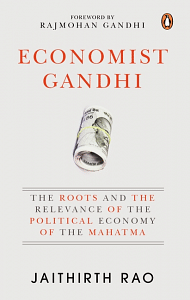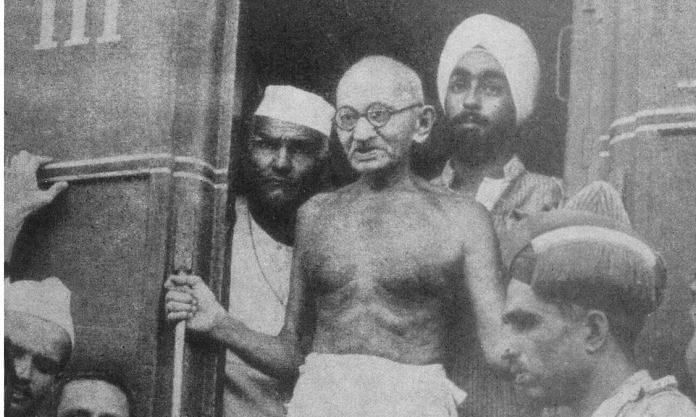Books written for students of economics and management make no references to Mahatma Gandhi. The losers are the students. Gandhi, with his encyclopedic range of interests, has much to say that can be treated as complementary to mainstream economics and management theories, or as even an intrinsic part of them. His contributions, even at their most eccentric, have a universal appeal, as Ramachandra Guha (2018) points out, and are characterized not only by high idealism, which one undoubtedly expects from a great soul, but also by their almost invariably empirical grounding and suitability for wide practical application. Attempting to make an intellectual connection between Gandhi and Adam Smith, the ‘father’ of economics, may appear to be a formidable task, given that Gandhi is popularly associated with asceticism and anti-industrialism. But I would submit that this task is no more formidable than the philosopher Akeel Bilgrami’s attempt to establish linkages between Gandhi and Marx.
Bilgrami makes the case that many of Gandhi’s criticisms of modern civilization ‘had to do with the wrongs in particular of the social, cultural, and cognitive fall-out of capitalist economies’. The atheist Marx and the intensely religious Gandhi in this case are ideologically connected in their common approach to the ‘fallout’ of capitalism. Looked at this way, Bilgrami’s approach does not appear to be contrived or convoluted. Bilgrami goes on to make the case that both Gandhi’s and Marx’s approaches to norms and values are at the opposite ends of that of David Hume and Adam Smith, the quintessential philosophers of the Scottish Enlightenment and possibly the ‘original’ philosophers of market capitalism (Bilgrami, 2012; Bilgrami, 2015). It is not my intent here to explore Bilgrami’s brilliant exposition.
My point of departure is that irrespective of the ex-ante priors, the net result of the approaches of Gandhi and Adam Smith can in fact end up having an uncanny congruence. I submit that my approach in seeking parallels between the agnostic Adam Smith and the religious or spiritual Gandhi is not particularly convoluted or unrealistic. For this, one needs to go back to the Adam Smith of the Theory of Moral Sentiments, published some seventeen years before the Wealth of Nations. This outstanding work of Smith on moral philosophy can be seen as the precursor and as the foundation without which his treatise on political economy would not have a proper context (Smith, 2002).
Also read: Gandhi told Gujarat striking millworkers not to be angry at boss or gamble, gossip
I am grateful to Professor Amartya Sen for directing me to Smith’s earlier work in order to fully understand a philosopher who had much more to say than the oft-quoted sentence from the Wealth of Nations: ‘It is not from the benevolence of the butcher, the brewer or the baker that we expect our dinner, but from their regard to their own interest’ (Smith, 1982). The younger Smith of the Theory of Moral Sentiments suggests that each of us derives a personal moral compass by referring to ‘an impartial spectator’ who exists as a ‘man within the breast’ (Smith, 2002). The ‘impartial spectator’ presumably stands close to but outside a human being and watches the actions and behaviours of that person. The analogous nature of Gandhi’s ‘still small voice within’ (CW, 1999, v. 76, p. 349) of his conscience is not to be missed. It is interesting to note that while making reference to the voice of conscience, Gandhi does not seek to directly bring in God or religion. In fact, as early as in January 1907, while in South Africa, Gandhi adopted a completely humanist vision when he wrote in Indian Opinion: ‘Man has two windows to his mind: through one he can see his own self as it is; through the other, he can see what it ought to be.’ (CW, 1999, v. 6, p. 214)
Writing about Smith’s position, his biographer Nicholas Phillipson makes the point that ‘Sometimes the voice of the impartial spectator would be judgemental, and sound like the voice of conscience or even of the deity himself’ (Phillipson, 2010). The believer Gandhi skips the deity, whom the agnostic Smith invokes—admittedly indirectly. A neat juxtaposition that has a trace of irony about it! Nowhere is the symmetry between Smith’s theory regarding the moral imperatives that drive human beings and Gandhi’s position seen better than in the supremacy that they assign to the ‘impartial spectator’ and to one’s ‘conscience’. Gandhi has this to say: ‘There is a higher court than the courts of justice and that is the court of conscience.’ Phillipson argues that for Smith the impartial spectator ‘had come to mean more’, ‘than the judgement of friends and acquaintances’ (Phillipson, 2010). Despite the supreme position assigned to the impartial spectator and to one’s conscience by Smith and by Gandhi, respectively, the interesting thing is that both were acutely sensitive to the need to attempt one’s level best to extend one’s personal moral judgements into the sphere of social interactions with other human beings.
The spiritual Gandhi, who spent a lifetime wrestling with his conscience and seeking his God, and the agnostic Smith, who is careful never to give a religious patina to his impartial spectator, nevertheless end up not only with a moral vision that has similarities, but also with a similar concern for practical social consequences, as seen in their concern for ‘something which other men can go along with’—or, in Gandhi’s case, with ‘convincing adversaries’ like the British rulers. The attempt to establish an intellectual linkage between Smith and Gandhi should not be seen as trying to force a square peg into a round hole. It stems from an estimation of Smith as a sensitive moral philosopher, whose capacious mind travelled well beyond economic formulations. Simultaneously, Gandhi needs to be seen beyond his caricature as an ascetic, anti-industrial Luddite. We need to keep in mind that Gandhi said and wrote a great deal over the years, not all of which can be comfortably placed in a single convenient philosophical box. Smith has been too often identified with economists of the utilitarian school who followed him and may have derived their ideas based on their interpretations of Smith.
Also read: Not really Nehru, it was Gandhi and Congress ‘Right’ who made Bose resign as party president
There is almost an analogous parallel when Amartya Sen emphatically points out that the association of Smith with the utilitarian school does not make Smith a simple-minded utilitarian. Gandhi’s support of free markets should not surprise anyone who is acquainted with Gandhi’s emphasis on individual freedom, his distrust of a behemoth state and his lifelong association with traders and businessmen, first as clients in South Africa and later as friends, patrons and political associates, both in South Africa and in India. It must be noted that Gandhi had ample opportunity to change his position over the years, especially given the fact that his political associates Nehru and Bose were votaries of socialism.
In the years to come, hopefully references to Mahatma Gandhi will exponentially increase in the literature on economics and management and not remain confined to the cloister of ‘Gandhian Studies’. When Gandhi goes beyond stakeholder analysis and corporate social responsibility studies and starts cropping up in papers on identity economics, behavioural economics and public policy, we can make the claim that economist Gandhi has arrived. Gandhi might take his place along with Adam Smith as a profound and seminal thinker who had much to offer in our expanding definitions of homo economicus. Even the thought that the Mahatma referred to Christ as ‘the greatest economist of his time’ can send a shiver up our spines.
 This excerpt from Jaithirth Rao’s ‘Economist Gandhi: The Roots and the Relevance of the Political Economy of the Mahatma’ has been published with permission from Penguin Random House India.
This excerpt from Jaithirth Rao’s ‘Economist Gandhi: The Roots and the Relevance of the Political Economy of the Mahatma’ has been published with permission from Penguin Random House India.



